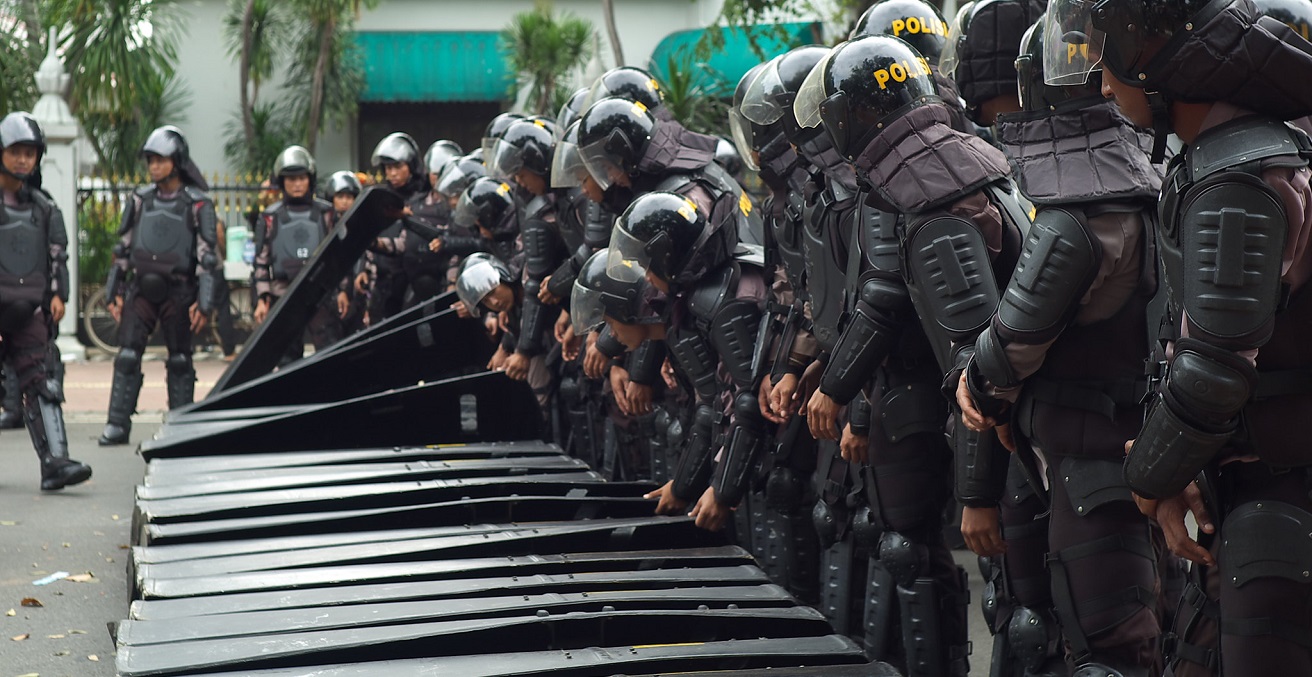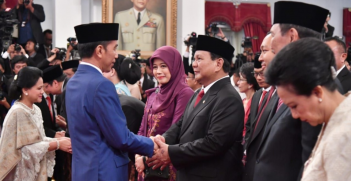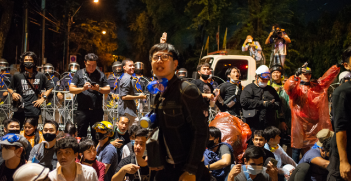Even Through a Pandemic, Terrorism Persists in Indonesia

Despite an ongoing health crisis, the hunt for terrorists in Indonesia has not ceased. How do we understand this, and what keeps terrorism alive even though the pandemic also threatens terrorist groups?
On 11 July 2021, the Special Joint Operations Command (Koopsgabssus) Tricakti troops shot dead two East Indonesia Mujahideen (MIT) terrorists, Rukli and Ahmad Panjang, in Poso, Central Sulawesi. The joint forces of Koopsgabssus Tricakti had previously been involved in a shootout with several members of the Poso MIT terrorist in the Tokasa Mountains in Central Sulawesi. The Poso area has been a battleground for the MIT against security personnel, with terrorists hiding in the challenging terrain and dense forests.
Terrorist acts and the arrests of suspected terrorists by the police amid the COVID-19 pandemic persist in Indonesia. Throughout 2020, the police worked to prevent acts of terrorism in Indonesian territory, arresting 228 suspects. Recent incidents include a suicide bombing on 28 March 2021, a Sunday, at the gate of the Sacred Heart of Jesus Cathedral Church in Makassar, South Sulawesi Province. Local police confirmed that fourteen people, including worshippers and church security personnel, were injured. It was the 552nd terrorist attack in the period from the 2000- 2021 in Indonesia. Another incident occurred on 31 March, when a 25-year-old female pointed an airsoft gun at Jakarta Police Headquarters. She was got shot dead immediately. These terrorist attacks in Poso, Makassar, and Jakarta confirmed the National Counterterrorism Agency (BNPT) reports that terrorist movements during the COVID-19 pandemic did not wither.
Since the July 2014 declaration of a caliphate by Abu Bakr al Baghdadi, leader of the Islamic State of Iraq and Greater Syria (ISIS), at least 18 extremist groups are known to support ISIS in Indonesia. Among these groups, four of them are categorised as takfiri groups, which include the Darul Islam’s inspired jihadist organisation MIT, recently ambushed in Poso, and the Jamaah Ansharut Daulah network (JAD), an international ISIS affiliate behind the March church attack.
Politically violent groups like JAD and MIT are the most pertinent if looking at terrorist groups in Indonesia. The takfiri ideology adopted by both groups, which considers those with different views to be “infidels,” manipulates the term jihad to mean killing other people in the name of Islam. Jihad is often regarded as the core ideology used as the basis for terrorist movements under the guise of Islam. The concept of “Jihad” is so strong that it is capable of mobilising individual terrorists to carry out acts of terror.
Reinterpreting and recovering the true meaning of “jihad” is often considered the best way to fight terrorism. Recently, JAD initiated more women in executing attacks, a change in the way the organisation exercises gender roles. Therefore, a comprehensive understanding of the meaning of jihad, including its substance and history, becomes a crucial part of policy exercises to prevent the spread of politics of jihad and terrorism movements.
Since pandemics do not stop terrorist attacks, it is also necessary to consider that there is a possibility that the direness created by the pandemic has driven people to act recklessly. Some people who have experienced calamitous challenges need an escape, which unfortunately can be fulfilled by looking to religion, sometimes with extreme interpretations. People who decide to join a terrorist network may be driven by the acute frustration they have experienced. These so-called “push factors” can come in many forms, such as a less harmonious family environment, an unfortunate economic situation, and poor education. A pandemic makes all of these things worse.
Meanwhile, external factors that shape social dynamics and reduce opportunities may increase the possibility of being exposed to the doctrine of terrorist ideology through social media. The government imposed social and physical restrictions, and medical advice to stay at home are prime examples of such factors. Moreover, terrorism can occur regardless of the situation and conditions, as shown through Indonesia’s experience during the COVID-19 pandemic. Thus, there remain numerous reasons and modes of how terrorism can develop, as was the case with everyday situations in the past.
Yet terror groups must also grapple with the pandemic. For example, terrorist groups affiliated with ISIS have followed the call by increasing activities in preparation for attacks. Those affiliated with Al Qaeda follow advice for keeping their congregations from being affected by COVID-19. Violent extremist groups have also been found misusing charitable donations during the pandemic. Also, during the pandemic, terrorists can still potentially exploit chaotic situations. For example, they can take advantage of the physical restrictions in place.
Globally, the United Nations Counter-Terrorism Committee Executive Directorate analysis mentioned those restrictions on international travel appropriate to COVID-19 could affect the movement of foreign terrorist fighters. In this respect, we should praise the effectiveness of security personnel in curbing terrorist activity during the pandemic. For example, facing mobility limitations because of physical restrictions, Indonesian law enforcement ambushed the network of the Zulfikar Rachman group across several provinces on 10 April 2020. This group manufactures firearms and homemade bombs and prepares plans for terror actions.
Overall, counterterrorism and prevention of violent extremism strategies in Indonesia need to be considered in a sustained and measured system, including identifying the need to strengthen SOPs in prisons and raising awareness of the potential for riots. In the context of the COVID-19 pandemic, any potential conflict in a prison setting can create panic, including among terrorist inmates.
Outside prisons, there is a need for greater oversight of the industry-sector strategic national vital objects. Furthermore, to reduce online radicalisation, the government must monitor cyberspace movements and terrorism fund networks, improve and increase counter-radicalisation and deradicalisation efforts, and enhance synergy between stakeholders. The last point is most important, especially with the existing prevention policy, which launched on January 2021 under Presidential Regulation Number 7 of 2021 concerning the National Action Plan for Prevention and Combating Extremism based on violence that leads to terrorism.
Throughout the pandemic, which has hit the country hard with 77,583 deaths reported by the WHO since January 2020, the Indonesian government has had to prioritise improving its health system accordingly. At the same time, in the face of persisting terrorism in the Southeast Asia region during the pandemic, Indonesia should remain alert to threats that may arise. Therefore, apart from enhancing domestic counterterrorism and preventing violent extremism policies, Indonesia must maintain and conceivably advance and activate the collective regional mechanism to oversee terrorist movements, online and offline. This way, Indonesia can still play its role as an active contributor to creating comprehensive security and peace in the region and the neighbouring countries in the foreseeable future.
Irine Hiraswari Gayatri is a PhD Candidate at the Monash Gender, Peace and Security, School of Social Sciences, Faculty of Arts Monash University. She is also a senior researcher at the Centre for Political Studies, Indonesian Institute of Sciences (LIPI). Irine obtained her MA from the Department of Peace and Conflict Research, Uppsala University, Sweden. In September and November 2017, she participated in regional forums facilitated by UN Women and UNODC in Bangkok to discuss the formulation of a national plan of action on countering and preventing violent extremism (P-CVE). From 2017-2019, Irine joined a small team led by the National Counter Terrorism Agency in developing the draft for National Action Plan on Preventing Violent Extremism in Indonesia.
This article is published under a Creative Commons License and may be republished with attribution.





